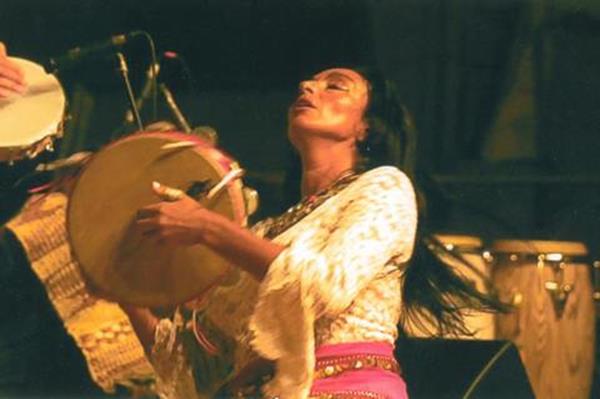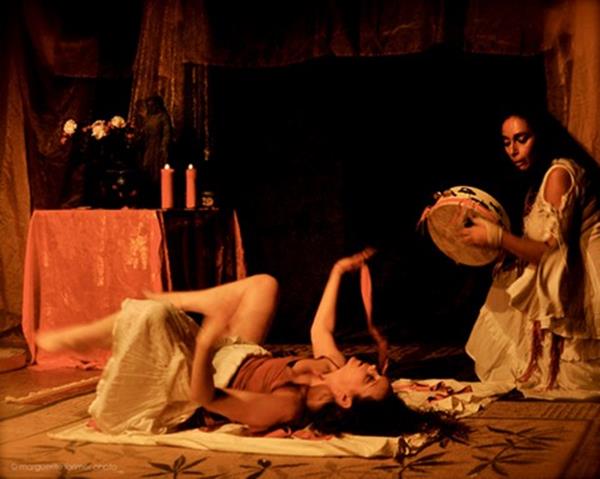Voices of the Tarantate
Blending ancient traditions with contemporary inspirations, Alessandra Belloni and company transformed pain to wholeness in ecstatic and cathartic chant and dance.

Alessandra Belloni in “Voices of the Tarantate” (Photo credit: Courtesy of Theater for the New City)
In the spare, black, open stage space of one of the Theater for the New City’s performance spaces, Belloni began the evening by speaking directly to the small audience. She explained that this work has been many years in the making, having its origins in her own experience with both cancer in 1986 and then the extended process of healing from it. Belloni said that in extreme and disorienting illness, a powerful vision of the Black Madonna, appeared to her; the Black Madonna then protected her and told her that she would become well by feeling other people’s pain. Ever since, Belloni has been leading transformative healing workshops culminating in the tarantella trance dance for victims of trauma and domestic abuse all around the world.
As the Voices of the Tarantate program notes explain, Belloni incorporates ceremonies honoring ancient classical goddesses such as Isis, Aphrodite, Artemis and Hecate with music of Italian, Brazilian, North African and Middle Eastern traditions. Belloni also especially honors the Black Madonna, whose story and statues are particularly important in Spain, Italy, Southern France and Central America: Mary Magdalene, Yemanja and Inanna. Belloni considers drums of all sorts, but especially frame drums and tambourines, to be powerful “female instruments,” embodying the very pulse of the mother-child relationship and functioning also as calls to prayer, parade, seduction and ecstasy.
Quite consciously – and accurately – Belloni presents herself as both an artist and a shaman. In her choreography and composing as well as in her own dancing and singing, Belloni oversees and embodies healing: over the course of the Voices of the Tarantate’s more than twenty short interconnected pieces, she presided over over a primal, sensuous and sometimes wild liturgy of pain, death, rebirth and resurrection.
According to the program notes, the “tarantate” of the work’s title refer to abused peasant women. In this Italian and Spanish medieval tradition, women afflicted with “tarantismo,” (the mental disorder which resulted from “repression of sexuality and erotic desires, exploitation by landowners, and a sad life that made women feel stuck in a spider web”) can only be cured by the “‘Pizzica Tarantata’ … a healing trance dance.”
The evening opened with Belloni and her troupe drumming, chanting and dancing traditional agricultural chants, a lullaby, work songs and laments, and a modernized excerpt from the magnificent late fourteenth century Libre Vermeil de Montserrat as well as the “Pizzica Tarantata.”
At the beginning of the evening, there lurked the possibility of a self-indulgent, somewhat dated earth-goddess-style feminism. Very soon, however, as the musicians’ skill, the dancers’ multifaceted artistry and Belloni’s hypnotic singing revealed the work’s complexity and originality, the primal power of Voices of the Tarantate – alternately tender, sensuous, frenzied, erotic, militant, reverent, delicate and uninhibitedly orgiastic – filled the space and roused the audience to a visceral, positive response.

Spider sequence from “Voices of the Tarantate” (Photo credit: M. Lorimer)
Belloni’s earthy dark mezzo voice can croon, wail, placate, summon and shimmer. Her own songs, such as “Black Madonna of the Sea” and “Canto di Sant’Irene,” have a timeless feel to them: they are derived from ancient and medieval chants but are clearly modern, accessible even to contemporary audiences with a historical sensibilities.
Belloni’s dance troupe is skilled and ardent. Dancer Francesca Silvano was particularly notable: her movements skillfully incorporated techniques and insights from dance styles including ballet and modern dance, and her dramatic acting was expressive and fluent.
Hilary Posey, known as Amara, offered a sublime performance of belly dance, sword and fire dancing. Her personal statement that these dance genres have “an organic essence … that … embodies and empowers her inner goddess and her wild spirit” made her collaboration with Belloni productive and effective.
Actress and singer Silinea Lucius played a critical role in the work. She provided spoken narratives of violation, abandonment, madness, renewal, sanity and ultimate celebration. She was successful in portraying both an archetype of victim turned victor and a unique woman presenting individual stories. Lucius’ credibility was solid in her monologues, but these texts themselves provided the one significant weakness in Voices of the Tarantate. Within her speeches, modern sociological diagnostic language – phrases such as “domestic violence,” “sexuality,” “intimidation” – seemed intrusive and unnecessary in the presence of spoken and sung material so otherwise compellingly mythic in quality.
Belloni spoke again directly to the audience after the hugely joyful conclusion of the performance. Adding details to some of the information in the lengthy program bulletin, she noted that Voices of the Tarantate was “a leap of faith” in its development and presentation, that she will continue to work with this material, in more music and dance as well as film and a book, and that she is being guided in this ongoing project by the Black Madonna. She shared, “I am mostly a performer.” Then she added with commingled modesty and pride, “I am also a healer.”
Immediately thereafter, she invited audience members to come forward to join with the dancers and drummers. Nine people did indeed then dance with unrestrained abandon and exhilaration.
Belloni’s overall project around these issues of pain and restorative salvation deserves to be much more widely known. Belloni and her music and dance are positive proof that artistic creativity can be part of the solution to some of society’s deepest and most painful problems.
Voices of the Tarantate: Alessandra Belloni and the Daughters of Cybele with Women Drummers against Violence: (October 17 – 20, 2014)
Theater for the New City, 155 First Avenue and 10th Street, in Manhattan
For tickets, call 212-254-1109 or visit http://www.theaterforthenewcity.net
For more information, visit Abelloni@aol.com or http://www.AlessandraBelloni.com






Leave a comment